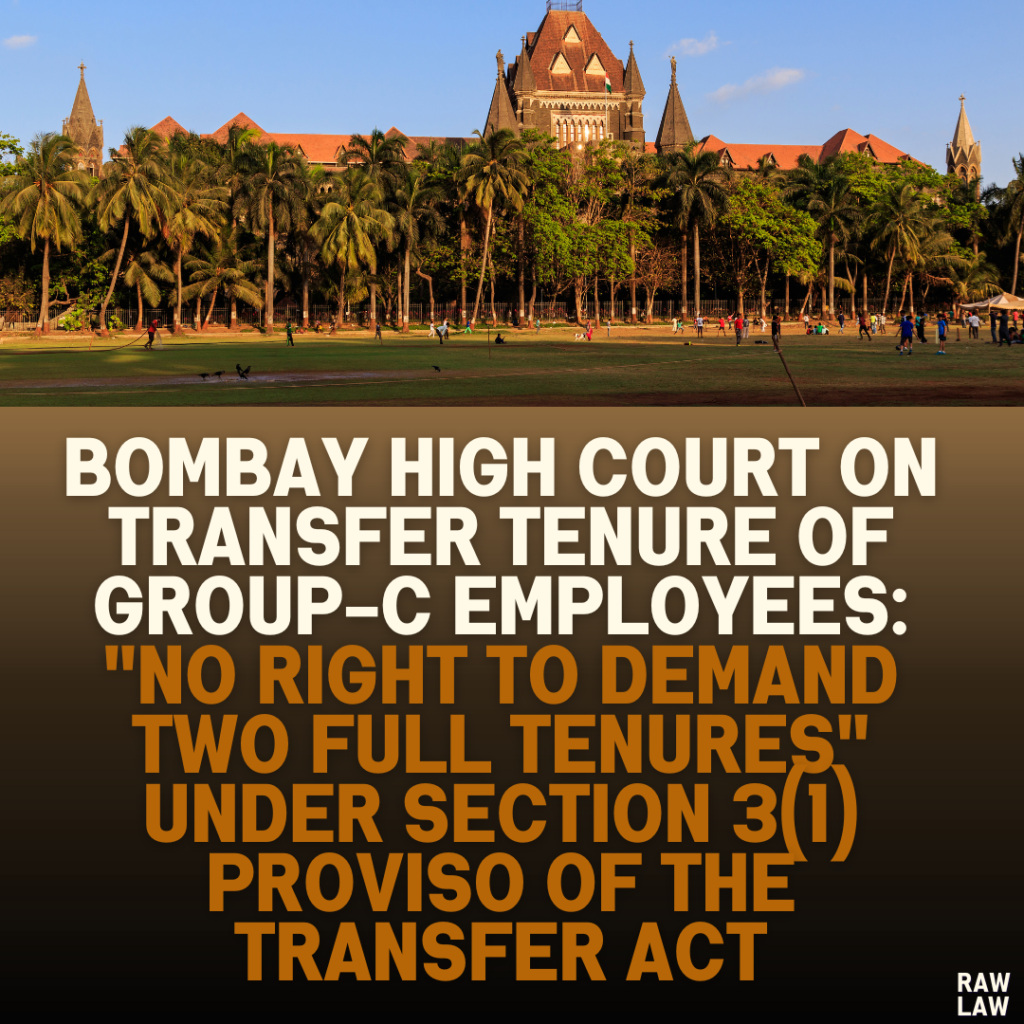1. Court’s Decision
The Bombay High Court ruled that Section 3(1) of the Maharashtra Government Servants Regulation of Transfers and Prevention of Delay in Discharge of Official Duties Act, 2005 (Transfer Act) does not grant Group-C employees in non-secretariat services a “right” to demand two tenures of three years each (total six years) on the same post. Instead, the proviso gives the government discretionary authority to retain such employees for a maximum of six years in the same office or department. The court clarified that the proviso does not create enforceable rights for employees but acts as a guideline for administrative decisions.
2. Facts of the Case
- The petitioner, a Circle Officer in Raigad, Maharashtra, was transferred before completing six years in his current post.
- He contended that, under the first proviso to Section 3(1) of the Transfer Act, Group-C employees are entitled to two full tenures (six years) on the same post unless special circumstances justify a transfer.
- His transfer was upheld by the Maharashtra Administrative Tribunal, prompting him to approach the High Court.
- The petitioner argued that the transfer violated his statutory tenure under the Act.
3. Issues Raised
- Does the first proviso to Section 3(1) of the Transfer Act confer a statutory right on Group-C employees in non-secretariat services to complete two tenures (six years) on the same post?
- Was the petitioner’s transfer order arbitrary or inconsistent with the provisions of the Act?
4. Petitioner’s Arguments
The petitioner, through senior counsel, presented the following points:
- Guaranteed Tenure of Six Years:
- The first proviso to Section 3(1) ensures two tenures (six years) for Group-C employees in non-secretariat services.
- Any transfer before completing this tenure is contrary to the legislative intent.
- Legislative Intent:
- The Act’s purpose is to prevent arbitrary transfers and provide stability to employees, ensuring administrative continuity and professionalism.
- Precedent Support:
- The petitioner relied on Sachin Sadashiv Raut v. State of Maharashtra, where the court allowed a Group-C employee to remain in a post for six years.
- Legitimate Expectation:
- Even if the statute does not explicitly create a right, employees have a legitimate expectation to serve the prescribed tenure unless administrative exigencies justify a transfer.
5. Respondents’ Arguments (Government’s Stand)
Represented by the Advocate General, the respondents countered the petitioner’s claims with the following points:
- Discretionary Nature of Transfers:
- Section 3(1) specifies a normal tenure of three years for Group-C employees.
- The first proviso allows the government to retain employees for a maximum of six years but does not create a right for employees to demand this.
- Purpose of the Transfer Act:
- The Act regulates transfers to ensure efficient public administration. It does not empower employees to dictate transfer decisions.
- Administrative Efficiency:
- Transfers are an incident of service and are necessary to prevent stagnation, maintain accountability, and avoid misuse of official positions.
- Interpretation of the Proviso:
- The first proviso should be read as a limitation on the government’s discretion to extend an employee’s tenure beyond three years, not as a statutory entitlement.
- Precedents:
- The respondents relied on Santosh Nandalal Dalal v. State of Maharashtra, where the court held that the first proviso does not create enforceable rights for employees.
6. Analysis of the Law
The court analyzed the Transfer Act in detail to resolve the issue.
a. Provisions of the Transfer Act
- Section 3(1):
- Prescribes a normal tenure of three years for All India Service officers and Groups A, B, and C employees.
- First Proviso to Section 3(1):
- Allows Group-C employees in non-secretariat services to be retained for two full tenures (six years) in the same office or department.
- Section 4:
- Prohibits transfers before completion of tenure except in special circumstances.
- Section 5:
- Allows extension of tenure in exceptional cases.
b. Interpretation of the Proviso
The court emphasized that a proviso must be read in conjunction with the main provision:
- A proviso does not create independent rights unless explicitly stated.
- The first proviso in Section 3(1) limits the government’s discretion to extend an employee’s tenure but does not grant employees a statutory right to demand two tenures.
c. Precedents Examined
- Santosh Nandalal Dalal v. State of Maharashtra:
- Held that Group-C employees do not have an absolute right to two tenures; the government has discretion to retain them for up to six years.
- Sachin Sadashiv Raut v. State of Maharashtra:
- Suggested that employees are entitled to two tenures. However, this case involved a transfer before the completion of even three years and did not fully analyze the interplay between Section 3(1) and its proviso.
The court favored the reasoning in Santosh Nandalal Dalal, as it provided a more consistent interpretation of the Act.
7. Court’s Reasoning
- The first proviso is meant to prevent frequent transfers and provide stability but does not create enforceable rights for employees.
- Transfers are a matter of public administration and are necessary to maintain efficiency, prevent stagnation, and ensure impartiality.
- Interpreting the first proviso as creating a right for employees would hinder administrative flexibility and undermine public interest.
8. Conclusion
The court dismissed the petition, holding:
- The first proviso to Section 3(1) of the Transfer Act does not confer a right on Group-C employees to demand two full tenures.
- The petitioner’s transfer was valid and not arbitrary.
9. Implications of the Judgment
- For Employees: Reinforces that transfer is an incident of service, and employees cannot dictate their posting duration.
- For Government: Confirms the discretionary nature of transfers, ensuring administrative efficiency and public interest remain paramount.
- For Future Cases: Sets a clear precedent limiting the scope of employee challenges based on Section 3(1) of the Transfer Act.
